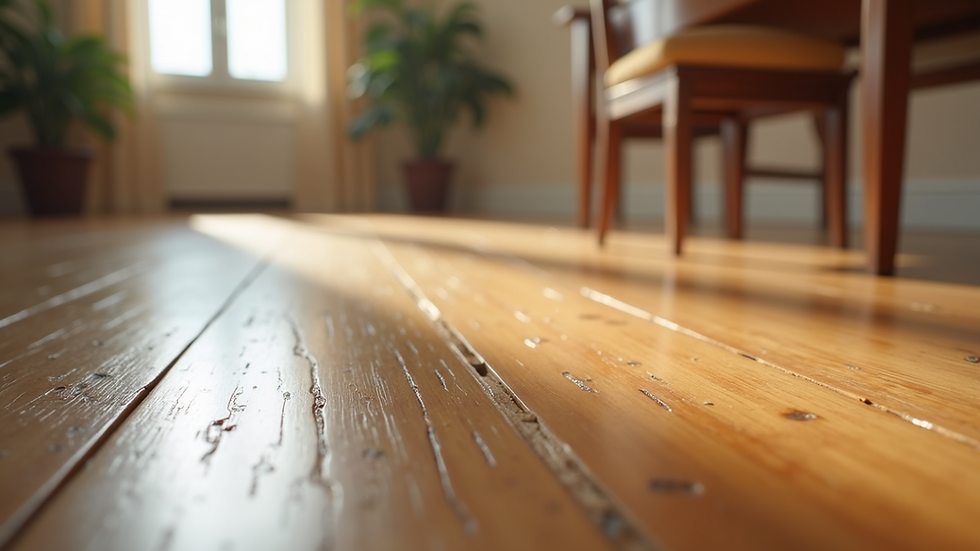Essential Floor Care Tips for Louisville Residents
- Stat Carpet Cleaning

- Jul 18, 2025
- 3 min read
Updated: Oct 6, 2025
Cleaning your floors is essential for maintaining their appearance and longevity. However, using the wrong products can lead to irreversible damage. It’s crucial to understand what cleaners are safe and effective for your specific flooring type.
The Impact of Cleaning Products on Your Floors
Many people underestimate the impact of cleaning products. Harsh chemicals can strip away protective coatings, leading to scratches and stains. This can be particularly problematic for hardwood and vinyl floors, which require special care.
🚫 Floor Cleaners You Should Avoid
1. Ammonia-Based Cleaners
Ammonia may work well on tile or other hard surfaces, but it’s a major risk for hardwood and vinyl. It strips away protective finishes, making your floors more vulnerable to scratches, stains, and wear.
What to Use Instead: Choose a pH-neutral floor cleaner made specifically for hardwood or LVP (luxury vinyl plank).
2. Oil-Based Cleaners (Like Murphy’s Oil Soap)
While marketed as natural and protective, oil soaps often leave a sticky film on floors. This residue attracts dirt, dulls the finish, and can make future professional cleaning more difficult.
What to Use Instead: A water-based cleaner designed for sealed wood or vinyl is a much safer option.
3. Bleach
Bleach is far too harsh for hardwood and vinyl. It can discolor the surface and eat away at the finish, leading to permanent damage—especially on older or unsealed floors.
What to Use Instead: Use a gentle, biodegradable disinfectant that clearly states it’s safe for your specific flooring type.
4. Generic All-Purpose Cleaners
Convenient doesn’t mean safe. Many all-purpose cleaners contain strong solvents and surfactants that strip away protective coatings, leaving your floors dull or cloudy.
What to Use Instead: Look for floor cleaners specifically labeled “safe for hardwood” or “safe for vinyl.”

5. Vinegar (Even Diluted)
Vinegar is often touted as a natural alternative, but its acidity can break down polyurethane and other protective finishes on hardwood. Over time, this leads to a loss of shine and even surface damage.
What to Use Instead: Opt for a mild, pH-balanced cleaner that’s formulated for hardwood or vinyl. If you prefer natural solutions, ensure they are floor-safe.
6. Highly Fragranced Cleaners
Strong scents may seem appealing, but they often come from synthetic additives that can irritate sensitive flooring materials—and your health. These products may also leave a chemical residue.
What to Use Instead: Choose unscented or naturally fragranced cleaners with essential oils and low-VOC formulations.
🧼 Smart Cleaning Practices from a Louisville Pro
✅ Use the Right Tools
Microfiber mops, soft cloths, and proper vacuum attachments can clean floors effectively without scratching or wearing down the finish. Avoid abrasive scrubbers and rough pads.
✅ Maintain a Regular Routine
Daily sweeping or vacuuming reduces grit and dirt that can scratch flooring. Schedule professional cleaning once or twice a year to maintain floor health and extend its lifespan.
✅ Always Patch-Test New Products
Before applying a new cleaner across your floors, test it on a small, hidden area. This helps prevent unexpected discoloration or chemical reactions with your finish.
📍 Local Tip from Stat Carpet Cleaning
In Louisville homes—especially in neighborhoods like Highlands and St. Matthews—we often see hardwood damage caused by improper cleaning products. Humid weather and older flooring materials make using the right cleaner even more important here in Kentucky.
💡 Final Thoughts
While it's easy to reach for a cleaner that smells nice or promises instant shine, doing so could cost you in the long run. Avoiding harsh chemicals and using the right tools can preserve your floors and save you from expensive repairs.
Need help getting your floors professionally cleaned the right way? Stat Carpet Cleaning provides expert hard surface floor cleaning services for homes and small businesses throughout Louisville. Contact us today for a free quote or to schedule your next floor cleaning service.

Adopt a mindful approach to your cleaning habits, and enjoy the beauty and durability of your floors for years to come.
❓ Frequently Asked Questions (FAQ)
Can I use vinegar to clean hardwood floors?
No. Vinegar is acidic and can wear down the finish on hardwood floors, leading to dullness and discoloration.
Is Murphy’s Oil Soap safe for vinyl floors?
No. While it may seem gentle, it can leave behind residue that attracts dirt and reduces the sheen of vinyl surfaces.
What kind of cleaner is safe for both hardwood and vinyl?
Use a pH-neutral cleaner specifically labeled as safe for hardwood and vinyl flooring. Always read the label before using.



Comments